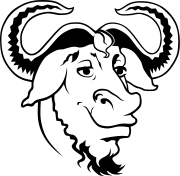
- Blogs (Apr 09, 2020)
- News (May 30, 2023)
- Organizations (Nov 04, 2023)
- People (Nov 03, 2023)
- Projects (Aug 08, 2024)
You can log-in or register for a user account here.

free/open-source | cross-platform | screencasting | live streaming
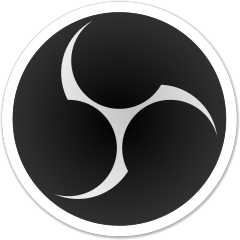
Provides real-time capture, scene composition, recording, encoding, and broadcasting via
• Real Time Messaging Protocol (RTMP);
• HTTP Live Streaming (HLS);
• Secure Reliable Transport (SRT);
• Reliable Internet Stream Transport (RIST); and/or
• Web Real-Time Communication (WebRTC).
OBS Github
 Peer-to-Patent is a pilot project in collaboration with the US Patent and Trademark Office. It was established in 2007 and recently extended/expanded to June 15, 2009. It is focused on helping the patent office perform high-quality examinations of pending patent applications by enlisting the public to help find and explain prior art.... Peer-to-Patent uses social software features to facilitate discussion amongst groups of volunteer experts. Users can upload prior art references, participate in discussion forums, rate other user submissions, add research references, invite others, and more. This helps the examiners focus their attention on the submission(s) of prior art that have the highest relevance to an application.
Peer-to-Patent is a pilot project in collaboration with the US Patent and Trademark Office. It was established in 2007 and recently extended/expanded to June 15, 2009. It is focused on helping the patent office perform high-quality examinations of pending patent applications by enlisting the public to help find and explain prior art.... Peer-to-Patent uses social software features to facilitate discussion amongst groups of volunteer experts. Users can upload prior art references, participate in discussion forums, rate other user submissions, add research references, invite others, and more. This helps the examiners focus their attention on the submission(s) of prior art that have the highest relevance to an application.Beth Simone Noveck, Law Professor, and Director, Institute for Information Law and Policy, New York Law School launched the Peer to Patent: Community Patent Review project.
Incentives for submitting an application to the project include:
• Expedited review. Public review begins one month after publication of the application. Review continues for four months, after which the patent examiner conducts an expedited examination of the patent application.
• Potentially stronger patents. If Peer-to-Patent review works as expected, patents that survive the process have already undergone considerable scrutiny and will be less at risk of a successful challenge later.
• Public service. Applicants can feel they are contributing to a valuable experiment in new models and technologies for public decision-making.
"The Peer-to-Patent Web site is built using open source technologies (RoR, MySQL, Linux OS). Hosted database/web servers, load balancers, and interactive features (threaded discussions, e-mail alerts, RSS feeds, social bookmarks, video clips, tagging, ratings, and more)."
Sponsors: CA, Inc., General Electric, Hewlett Packard, IBM, Intellectual Ventures, John D. and Catherine T. MacArthur Foundation, Microsoft, Omidyar Network, and Red Hat. Peertopatent.org content is licensed under a Creative Commons Attribution-Noncommercial-ShareAlike 3.0 US License, except where otherwise noted.


"Zoe and Styrobot, Looking Back - Rice University Art Gallery"
Source: Flickr • Photo by Mr. Kimberly
(CC) Attribution-Noncommercial-Share Alike 2.0
“Ironically, the robots actually critique
the very culture of which they are byproducts . . .
Every time something ships there’s a piece of
Styrofoam to keep it safe and sound . . .
I really look at these pieces as being
mechanical and robot in nature.
The result is a pretty poignant statement about what we buy . . .
and what we throw away.”
- Michael Salter, Associate Professor
Department of Digital Arts, University of Oregon
Time-lapse of "Art from Excess" at the San Jose Museum of Art.
 MIT Press Journals has recently published (under Creative Commons Attribution-Noncommercial-No Derivative Works Unported 3.0 license) a series on Digital Media & Learning, definitely worth examining "...the effect of digital media tools on how people learn, network, communicate, and play, and how growing up with these tools may affect peoples sense of self, how they express themselves, and their ability to learn, exercise judgment, and think systematically..."
MIT Press Journals has recently published (under Creative Commons Attribution-Noncommercial-No Derivative Works Unported 3.0 license) a series on Digital Media & Learning, definitely worth examining "...the effect of digital media tools on how people learn, network, communicate, and play, and how growing up with these tools may affect peoples sense of self, how they express themselves, and their ability to learn, exercise judgment, and think systematically..."See: ”Read open access” — complete creative commons'd and free editions . . .
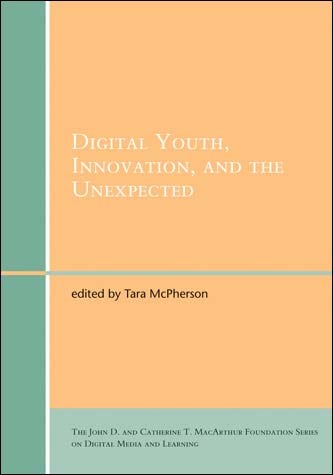 Digital Youth, Innovation, & the Unexpected
Digital Youth, Innovation, & the Unexpected(cc) Edited by Tara McPherson, Associate Professor, School of Cinematic Arts, University of Southern California.
How emergent practices and developments in young people's digital media can result in technological innovation or lead to unintended learning experiences and unanticipated social encounters.
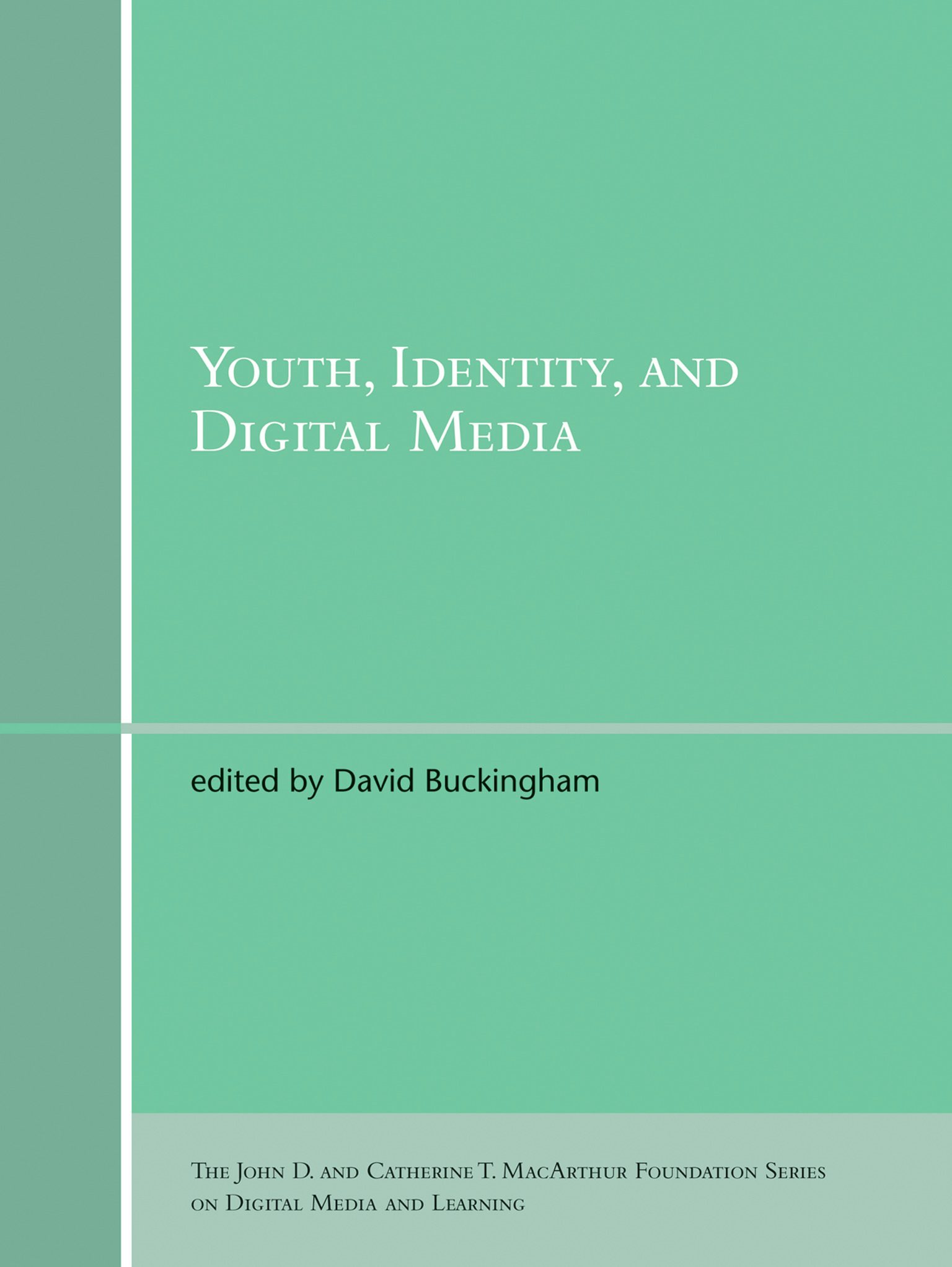 Youth, Identity, & Digital Media
Youth, Identity, & Digital Media (cc) Edited by David Buckingham, Professor, Institute of Education, London University.
Contributors discuss how growing up in a world saturated with digital media affects the development of young people's individual and social identities.
 "More and more practitioners are seeing the past-present divide is not something that's absolutely critical to the definition of what archaeology is... Many are beginning to understand archaeology more as a wider sensibility about how humans live with their material environments."
"More and more practitioners are seeing the past-present divide is not something that's absolutely critical to the definition of what archaeology is... Many are beginning to understand archaeology more as a wider sensibility about how humans live with their material environments."- Christopher Witmore, Landscape Archaeologist & Post-doctoral Research Associate, Joukowsky Institute for Archaeology and the Ancient World, Brown University from "Writing on the Walls" by Samir S. Patel, Archeology [Magazine], July/August 2007
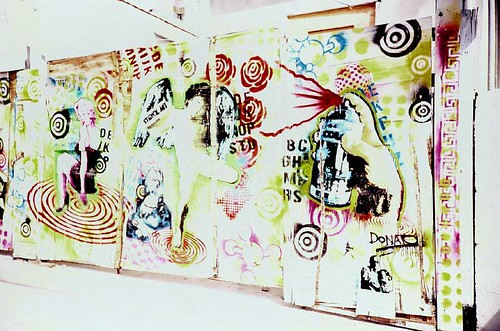
"Meta" by Schröedinger's Cat (São Paulo, São Paulo)
(CC) 20 February 2007 Attribution-Noncommercial-Share Alike 2.0 Generic
"A project devoted to the study of graffiti-covered walls as they change over time."
- BY CASSIDY CURTIS, THE GRAFFITI ARCHEOLOGY PROJECT & FLICKR SLIDESHOW POOL
"Archaeological sensibility" ? "...it resonants with the notion... that foregoes defining the discipline upon subject matter criteria ('the remote past') and instead emphasizes what is unique to how archaeology understands our complex relationships to things. Attention to minutiae of the everyday; detailed documentation of change through time; the processes behind the accretion of an archaeological trace; the individual and creative acts of even 'marginalized' groups. This broader and bolder view of what is unique to archaeology takes action and practice over etymology and definition to contribute a specialized perspective to deep time and modern material practices."
- Timothy Aaron Webmoor, Department of Anthropology, Interdisciplinary Archaeology Center, MetaMedia Laboratories, Stanford University

"VISION OF AN OPEN LIBRARY" | "LIBRARIES GOING OPEN (2007)"
By Brewster Kahle
• Table of Contents
• Guided Tour


Wikimania 2006 eArchive [8.09.06]
Wikimedia Conference, by Jimbo Wales, Eben Moglen, Lawrence Lessig, Judith Donath, Ward Cunningham, Chris Messina, Brewster Kahle, Michael Eisen, Jenny Preece, Mitch Kapor...

• Open-Source Networked Journalism Meets SmartMobs [8.09.06]
MasterNewMedia, by Robin Good
• Credibility and copyrights in the new improved media [8.09.06]
InTheField, by Erik Sundelof (2006 RDVP Fellow)
• Futurism Without Gadgets [8.07.06]
Open the Future (Podcast #1), by Jamais Cascio
• Chance and choice experiences, presencing as community art [8.06.06]
Community-Intelligence, by George Por
• Cell phones: A new tool in the war-zone blogosphere [8.01.06]
CNN, by Marsha Walton

• Can Technology change Social Processes? [7.30.06]
Reuters Digital Visions Program, by Carlos Miranda Levy (2004 Fellow)

• Introducing NewAssignment.Net [7.25.06]
Journalism.NYU.Edu, by Jay Rosen

• Stanford Fellow Imagines Every Cell Phone as Citizen Media Outlet [7.18.06]
PBS, by Mark Glaser

 From Imaginify, Social Software Applications (SSA) are web applications that enables people to rendezvous, connect or collaborate through a computer network or networks. Like photo games, an online "MadLibs." Take a story/poem/quote and swap in flickr images for words, letters...
From Imaginify, Social Software Applications (SSA) are web applications that enables people to rendezvous, connect or collaborate through a computer network or networks. Like photo games, an online "MadLibs." Take a story/poem/quote and swap in flickr images for words, letters...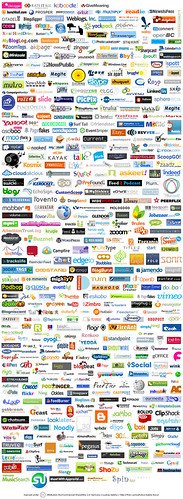
Click 'Read More'
 There are some new Codes emerging in the cyber-blogo-terrain... Google Code, Google's place for Open Source software. And Lawrence Lessig's Code v.2 (published in late 2005), the now-traditional view of the Internet as an uncontrollable, organic entity on its head, and explores the architecture and social systems that are changing every day and taming the frontier. Coders have already started their engines, now it is time to ramp up the community to new heights.
There are some new Codes emerging in the cyber-blogo-terrain... Google Code, Google's place for Open Source software. And Lawrence Lessig's Code v.2 (published in late 2005), the now-traditional view of the Internet as an uncontrollable, organic entity on its head, and explores the architecture and social systems that are changing every day and taming the frontier. Coders have already started their engines, now it is time to ramp up the community to new heights.
 "Intellectual property is the incentive system for the products of the future." -Microsoft 2005. OR how about a different alternative? From the Stream of Consciosness of Fen; "OpenPrivacy is the first open platform that enables user control over personal data". For individuals, "an i-name is a universal private address. A single unified lifetime address that only you control, so it never has to change no matter how many times you move, change jobs, change email addresses..." And now is there a co-intellgent dialogue in, out and around this issue?
"Intellectual property is the incentive system for the products of the future." -Microsoft 2005. OR how about a different alternative? From the Stream of Consciosness of Fen; "OpenPrivacy is the first open platform that enables user control over personal data". For individuals, "an i-name is a universal private address. A single unified lifetime address that only you control, so it never has to change no matter how many times you move, change jobs, change email addresses..." And now is there a co-intellgent dialogue in, out and around this issue?
- Apache HTTP Server
- Audacity [audio]
- Blender [3D suite]
- EMS Resources
- Firefox [browser]
- FreeCAD [modeler]
- GIMP.org [graphics]
- Inkscape [vector]
- LibreOffice
- Linux Kernel
- Mattermost [team]
- MediaWiki
- Moodle [LMS]
- Mozilla Hubs
- NetNewsWire
- Nightingale [music]
- OBS Studio
- QGIS [Geo-Info-Sys]
- Thunderbird [email]
- Thunderbird Lightning
- VLC [VideoLan]
- Wordpress [CMS]
- xiph Vorbis [ogg]
- XMPP [comm]
INTERNET ARCHIVE
WIKIMEDIA FOUNDATION
OPEN COURSEWARE
- Archive Educational
- BerkeleyX
- UCambridgeX
- ColumbiaX
- Commons
- EdX
- DelftX
- Encyclopedia of Life
- HarvardX
- Harvard Online
- Harvard U
- CancerCommons
- Identity Mashup
- LSEX
- Merlot
- MIT OpenCourseware
- MITX
- Neuropathy Commons
- Northwestern U
- OpenCulture
- Open Edu Global
- Open Journal Systems
- OpenStax at Rice
- Open U OER
- Oregon State U
- SchoolForge
- Stanford U
- Tree of Life (glossary)
- U of Michigan
- UTAustinX
- U of Oxford
- Wikiversity
- Yale Open Courses
• Deep Learning
• Machine Learning
• Reinforcement Learning
• Artificial Intelligence
OPEN FORGES
OPEN METAVERSE
• Blender [3D Suite]
• Firestorm Viewer
• GitHub
• Libre3D
• Metaverse Project
• Mozilla Hubs
• NIH 3D Print Exchange
• OpenKinect
• OpenNI2
• OpenSim
• OpenSourceVR
• OpenWonderland
• PlayCanvas
• Sirikata
• Sketchfab
• Thingiverse
• 3D Warehouse
• Unity 3D
• WebGL (Moz)
• WebXR API (Moz)
• Yeggi
• YouMagine
- Arxiv at Cornell
- Arxiv Computer Research
- Arxiv Mathematics
- Arxiv NonLinear Sciences
- Arxiv Physics
- Arxiv Quantitative Biology
- Berkeley Electronic Press
- Free Legal Resources
- MediArXiv
- Public Library of Science (PLoS)
- PLoS ONE
- PLoS Biology
- PLoS Complex Systems
- PLoS CompBio
- PLoS Genetics
- PLoS Medicine
- Science Commons
- Smithsonian
- Alternative Freedom
- Brothers Chudnovsky
- Century of Self
- Conundrum
- Design-e2
- Digital Nation
- Einstein's Big Idea
- The Elegant Universe
- Evolution
- The Facebook Dilemma
- Fritjof Capra
- Generation Like
- The Grey Video
- Growing Up Online
- How Art Made the World
- In the Age of AI
- Last Child in the Woods?
- Life Incorporated
- Merchants of Cool
- Mirror Neurons
- OurMedia
- OS Media
- The Persuaders
- Plastic Wars
- Present Shock
- RecentChangesCamp06
- Revolution OS
- Who Owns Culture?
- Definition
- MP3 7.2MB
- More A/V
- Stanford Talk
Games- Agility
- Drawing
- OS Games
- Spelling
Media Ecology- Definition
- Tetrad of Effects
Optics- Dymaxion Map
- Hubble Telescope
- James Web Telescope
- Map - Territory
- Op Art
- Virtual Globe
- Visible Earth
Systems Science- 68th Proceedings
- 67th Proceedings
- 66th Proceedings
- 65th Proceedings
- 64th Proceedings
- 63rd Proceedings
- 62nd Proceedings
- 61st Proceedings
- 60th Proceedings
- 59th Proceedings
- 58th Proceedings
- 57th Proceedings
- 56th Proceedings
- 55th Proceedings
- 54th Proceedings
- 53rd Proceedings
- 52nd Proceedings
- 51st Proceedings
- 50th Proceedings
- Retrospective 12
- Retrospective 11
- Retrospective 10
- Retrospective 09
- Retrospective 08
- Retrospective 07
- Retrospective 06


